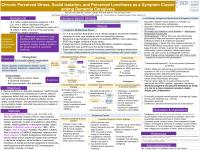Community stress-busting program for family caregivers of patients with dementia
View File(s)
- Author(s)
- Details
-
Lewis, Sharon Lynnette, RN, PhD, FAAN; Miner-Williams, Denise, RN, PhD
- Sigma Affiliation
- Gamma Sigma
Visitor Statistics
Visits vs Downloads
Visitors - World Map
Top Visiting Countries
| Country | Visits |
|---|
Top Visiting Cities
| City | Visits |
|---|
Visits (last 6 months)
Downloads (last 6 months)
Popular Works for Lewis, Sharon Lynnette by View
| Title | Page Views |
|---|
Popular Works for Lewis, Sharon Lynnette by Download
| Title | Downloads |
|---|
View Citations
Citations
Purpose: As caregivers assume responsibilities for family members who are unable to care for themselves, they experience a tremendous amount of change and stress in their lives. The Community Stress-Busting Program (CSBP) for Family Caregivers was developed through research to help family caregivers cope with their role.
Methods: The CSBP consists of a 9-week intervention where caregivers meet in small groups for 90 minutes/session. The sessions are focused on stress management techniques, problem-solving approaches, coping strategies, and information about dementia and challenging behaviors of dementia patients. Caregiver handbooks, an audio meditation CD, a Relaxation Strategies DVD, and comprehensive facilitators' manual are part of the toolkit that was developed to assist in maintaining fidelity to the original research-based program. The model for dissemination of the program is a master trainer-lay leader model delivered in a collaborative effort with many community agencies throughout central and south Texas.
Results: On an individual level, caregivers who participated have shown significantly lowered stress, depression, and caregiver burden levels as well as improved quality of life. In addition, they have experienced improvement in their ability to relax and manage stress. The results of the dissemination part of the research program also indicate that collaboration was effective in designing, implementing, and disseminating a community-based program for family caregivers. The next step is the determination of the long-term sustainment of the program.
Conclusions: The CSBP is an effective intervention for family caregivers that can be delivered in a community setting. A key question that still needs to be addressed is what can be done to have the CSBP be a self-sustaining program delivered in various community settings. Note: The original research-based program was funded by the National Institutes of Health. The dissemination project is funded by the Administration on Aging.
Items submitted to a conference/event were evaluated/peer-reviewed at the time of abstract submission to the event. No other peer-review was provided prior to submission to the Henderson Repository.
| Type | Presentation |
| Acquisition | Proxy-submission |
| Review Type | Abstract Review Only: Reviewed by Event Host |
| Format | Text-based Document |
| Evidence Level | N/A |
| Research Approach | N/A |
| Keywords | Family Caregivers; Community Dissemination; Alzheimer's Disease and Dementia |
| Name | 23rd International Nursing Research Congress |
| Host | Sigma Theta Tau International |
| Location | Brisbane, Australia |
| Date | 2012 |
All rights reserved by the author(s) and/or publisher(s) listed in this item record unless relinquished in whole or part by a rights notation or a Creative Commons License present in this item record.
All permission requests should be directed accordingly and not to the Sigma Repository.
All submitting authors or publishers have affirmed that when using material in their work where they do not own copyright, they have obtained permission of the copyright holder prior to submission and the rights holder has been acknowledged as necessary.
Related items
Showing items related by title, author, creator and subjects.
-
Family dementia caregivers' perceptions of the Virtual Dementia Tour®: A changed reality
Harrington, Candace CurrieFamily dementia caregiving involves many challenges that often lead to stress and frustration. A subjective understanding of the daily struggles associated with dementia is not possible unless one has the disease; therefore, ... -
Chronic perceived stress, social isolation, and perceived loneliness as a symptom cluster among dementia caregivers
Kovaleva, Mariya Alekseyevna; Hepburn, Kenneth W.; Spangler, Sydney A. (2016-03-21)Session presented on Saturday, November 7, 2015 and Sunday, November 8, 2015: Background: Caregivers of persons with dementia are at risk for chronic perceived stress, social isolation, and perceived loneliness. Chronic ... -
The experience of transitioning to the caregiving role for a family member with Alzheimer's disease or a related dementia
Czekanski, Kathleen E.Alzheimer’s disease is a chronic, debilitating disease that currently affects approximately 5.1 million Americans (Alzheimer’s Association 2007). The majority of these individuals are being cared for at home ... -
Experiences of caregivers of dementia patients with an integrated primary care model
Kovaleva, Mariya AlekseyevnaFew U.S. dementia care programs are led by advanced practice registered nurses (APRNs), including a dementia patient-centered medical home, the Integrated Memory Care Clinic (IMCC) at Emory Healthcare. To our best knowledge, ... -
Effects of support groups on the primary family caregivers
Yang, Chi-Hsuan Asphodel; Lin, Shu-Chin (2017-07-05)Objective: The purpose of this study was to investigate the effect of a support group for primary family caregivers of elderly with dementia on both the caregiver's burden and the quality of life. Methods: A ...





